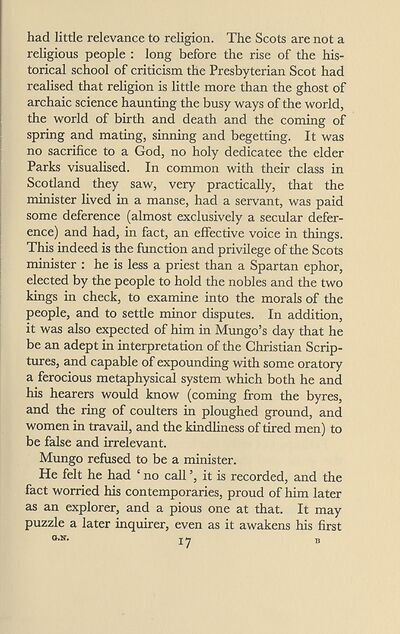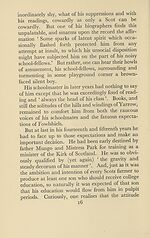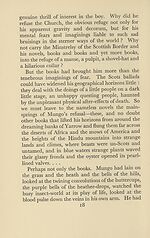Niger
(23)
Download files
Complete book:
Individual page:
Thumbnail gallery: Grid view | List view

had litde relevance to religion. The Scots are not a
religious people : long before the rise of the his¬
torical school of criticism the Presbyterian Scot had
realised that religion is little more than the ghost of
archaic science haunting the busy ways of the world,
the world of birth and death and the coming of
spring and mating, sinning and begetting. It was
no sacrifice to a God, no holy dedicatee the elder
Parks visualised. In common with their class in
Scotland they saw, very practically, that the
minister lived in a manse, had a servant, was paid
some deference (almost exclusively a secular defer¬
ence) and had, in fact, an effective voice in things.
This indeed is the function and privilege of the Scots
minister : he is less a priest than a Spartan ephor,
elected by the people to hold the nobles and the two
kings in check, to examine into the morals of the
people, and to settle minor disputes. In addition,
it was also expected of him in Mungo’s day that he
be an adept in interpretation of the Christian Scrip¬
tures, and capable of expounding with some oratory
a ferocious metaphysical system which both he and
his hearers would know (coming from the byres,
and the ring of coulters in ploughed ground, and
women in travail, and the kindliness of tired men) to
be false and irrelevant.
Mungo refused to be a minister.
He felt he had c no call it is recorded, and the
fact worried his contemporaries, proud of him later
as an explorer, and a pious one at that. It may
puzzle a later inquirer, even as it awakens his first
B
religious people : long before the rise of the his¬
torical school of criticism the Presbyterian Scot had
realised that religion is little more than the ghost of
archaic science haunting the busy ways of the world,
the world of birth and death and the coming of
spring and mating, sinning and begetting. It was
no sacrifice to a God, no holy dedicatee the elder
Parks visualised. In common with their class in
Scotland they saw, very practically, that the
minister lived in a manse, had a servant, was paid
some deference (almost exclusively a secular defer¬
ence) and had, in fact, an effective voice in things.
This indeed is the function and privilege of the Scots
minister : he is less a priest than a Spartan ephor,
elected by the people to hold the nobles and the two
kings in check, to examine into the morals of the
people, and to settle minor disputes. In addition,
it was also expected of him in Mungo’s day that he
be an adept in interpretation of the Christian Scrip¬
tures, and capable of expounding with some oratory
a ferocious metaphysical system which both he and
his hearers would know (coming from the byres,
and the ring of coulters in ploughed ground, and
women in travail, and the kindliness of tired men) to
be false and irrelevant.
Mungo refused to be a minister.
He felt he had c no call it is recorded, and the
fact worried his contemporaries, proud of him later
as an explorer, and a pious one at that. It may
puzzle a later inquirer, even as it awakens his first
B
Set display mode to:
![]() Universal Viewer |
Universal Viewer | ![]() Mirador |
Large image | Transcription
Mirador |
Large image | Transcription
Images and transcriptions on this page, including medium image downloads, may be used under the Creative Commons Attribution 4.0 International Licence unless otherwise stated. ![]()
| The books of Lewis Grassic Gibbon > Niger > (23) |
|---|
| Permanent URL | https://digital.nls.uk/205174563 |
|---|
| Description | Sixteen books written by Lewis Grassic Gibbon (1901-1935), regarded as the most important Scottish prose writer of the early 20th century. All were published in the last seven years of his life, mostly under his real name, James Leslie Mitchell. They include two works of science fiction, non-fiction works on exploration, short stories set in Egypt, a novel about Spartacus, and the classic 'Scots Quair' trilogy which includes 'Sunset Song'. Mitchell's first book 'Hanno, or the future of exploration' (1928) is rare and has never been republished. |
|---|---|
| Additional NLS resources: |
|

